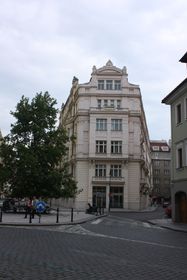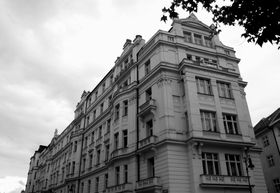Dlouhá Street 16, Staré Město
 Dům u Zlaté štiky
The secessionist-style apartment building “Of the Golden Pike” was erected in the years 1911-1914 by the Czech architect Karel Janda on the ground occupied by two buildings which originated in the 15th century and had been removed during the course of urban renewal: originally the house “Of the Golden Pike” and “Of the Golden Cow”. The original architectural plans testify to the studio Kafka mentions and the elevators he complained about. During Kafka’s time there were a pub and a printing shop on the ground floor of the new structure.
Dům u Zlaté štiky
The secessionist-style apartment building “Of the Golden Pike” was erected in the years 1911-1914 by the Czech architect Karel Janda on the ground occupied by two buildings which originated in the 15th century and had been removed during the course of urban renewal: originally the house “Of the Golden Pike” and “Of the Golden Cow”. The original architectural plans testify to the studio Kafka mentions and the elevators he complained about. During Kafka’s time there were a pub and a printing shop on the ground floor of the new structure.
On March 15, 1915, Kafka moved into new living quarters on the fifth floor of the house „Of the Golden Pike”, a newly constructed building, and he remained there until the end of February 1917. He wrote to Felice Bauer: “An especially comfortable friendly corner room, two windows, a balcony door. View out onto many roofs and churches. Tolerable people, since with some practice I don’t have to see them. Noisy street, heavy vehicles in the earliest part of the morning, which I have almost grown used to. The room, however, uninhabitable for me. Although it does lie at the end of a long antechamber and is outwardly isolated enough it is a concrete house; I hear, that is, I heard until after 10 o’clock the sights of the neighbors, the conversation of the people living below, here and there a bang from the kitchen. Besides above the thin ceiling of the room there is a floor and one can never know on which late afternoon, just when I want to work, a servant girl hanging up the washing won’t literally, in complete innocence, put her little boot right on my skull. Now and then there was also piano playing and in summer from the semicircle of the other encroaching houses singing, a violin and a gramophone. Anything approximating silence only from 11 o’clock at night on. So, impossibility to gain peace, complete homelessness, freeing place of insanity, increasingly greater weakness and hopelessness.”
 Dům u Zlaté štiky
“I switched over into a room in which the noise is around ten times greater than in the earlier one, but which is otherwise incomparably nicer. I thought myself to be detached from the location and the appearance of the room. But I’m not. Without a freer view, without the possibly a tower in the distance, even if it can’t be open countryside, without this I am a miserable, depressed person; although I can’t pin down what part of my misery is on account of the room, it can’t be small; I even have the morning sun in my room and since there are much lower roofs around, the sunshine comes fully and straight away to me. But I don’t only have the morning sun, because it is a corner room and two windows look out to the southwest. But so I don’t get too high spirited, somebody above me in a (empty, unrented!) studio tramps back and forth in boots and has set up some kind of useless noise-machine there, that gives the illusion of a game of ninepins. A heavy ball, thrown quickly, rolls the full length of the ceiling of the room, strikes in the corner and rolls back with a dull roar.”
Dům u Zlaté štiky
“I switched over into a room in which the noise is around ten times greater than in the earlier one, but which is otherwise incomparably nicer. I thought myself to be detached from the location and the appearance of the room. But I’m not. Without a freer view, without the possibly a tower in the distance, even if it can’t be open countryside, without this I am a miserable, depressed person; although I can’t pin down what part of my misery is on account of the room, it can’t be small; I even have the morning sun in my room and since there are much lower roofs around, the sunshine comes fully and straight away to me. But I don’t only have the morning sun, because it is a corner room and two windows look out to the southwest. But so I don’t get too high spirited, somebody above me in a (empty, unrented!) studio tramps back and forth in boots and has set up some kind of useless noise-machine there, that gives the illusion of a game of ninepins. A heavy ball, thrown quickly, rolls the full length of the ceiling of the room, strikes in the corner and rolls back with a dull roar.”
“In my room, of course, there probably all hell breaks loose; behind the right wall logs are apparently being stacked, one hears how a trunk is loosened from the wagon then it is raised it sighs like a living thing than a crash, it falls and the resonance of the whole cursed concrete house absorbs it. Above the room in the attic the machinery of the elevator drones and reverberates through the empty attic space. (That is the studio ghost I supposed earlier; there is, however, also a servant girl who hanging up the laundry to dry literally gropes her way over the top of my cranium with her wooden clogs.)”
During his long, nearly two year stay on Dlouhá, Kafka hardly wrote anything. With his sister's help, he began to hunt for some modest quarters – an attic if necessary – preferably in one of the old palaces on the other side of the Vltava. Franz was extremely happy in the fall of 1916 when Ottla offered him asylum in the tiny house she had been renting on Hradčany’s Golden Lane.
